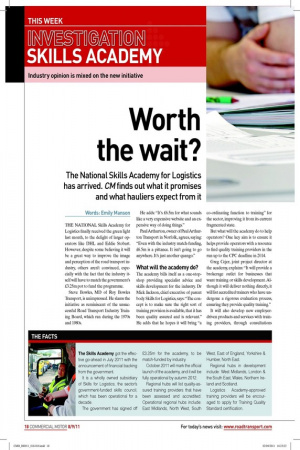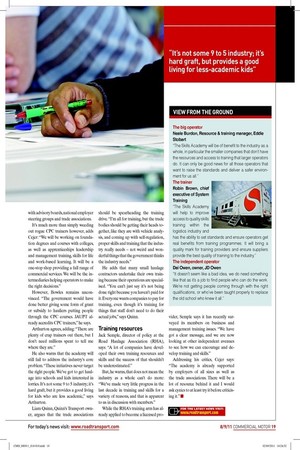Worth the wait?
Page 14

Page 15

If you've noticed an error in this article please click here to report it so we can fix it.
The National Skills Academy for Logistics has arrived. CM finds out what it promises and what hauliers expect from it Words: Emily Manson
THE NATIONAL Skills Academy for Logistics inally received the green light last month, to the delight of larger operators like DHL and Eddie Stobart. However, despite some believing it will be a great way to improve the image and perception of the road transport industry, others aren’t convinced, especially with the fact that the industry itself will have to match the government’s f.3.25m pot to fund the programme.
Steve Bowles, MD of Roy Bowles Transport, is unimpressed. He slams the initiative as reminiscent of the unsuccessful Road Transport Industry Training Board, which ran during the 1970s and 1980s. He adds: “It’s f.6.5m for what sounds like a very expensive website and an expensive way of doing things.” Paul Arthurton, owner of Paul Arthurton Transport in Norfolk, agrees, saying: “Even with the industry match-funding, f.6.5m is a pittance. It isn’t going to go anywhere. It’s just another quango.”
What will the academy do?
The academy bills itself as a one-stopshop providing specialist advice and skills development for the industry. Dr Mick Jackson, chief executive of parent body Skills for Logistics, says: “The concept is to make sure the right sort of training provision is available, that it has been quality assured and is relevant.” He adds that he hopes it will bring “a co-ordinating function to training” for the sector, improving it from its current fragmented state.
But what will the academy do to help operators? One key aim is to ensure it helps provide operators with a resource to ind quality training providers in the run up to the CPC deadline in 2014.
Greg Cejer, joint project director at the academy, explains: “It will provide a brokerage outlet for businesses that want training or skills development. Although it will deliver nothing directly, it will list accredited trainers who have undergone a rigorous evaluation process, ensuring they provide quality training.” It will also develop new employerdriven products and services with training providers, through consultations with advisory boards, national employer steering groups and trade associations.
It’s much more than simply weeding out rogue CPC trainers however, adds Cejer: “We will be working on foundation degrees and courses with colleges, as well as apprenticeships leadership and management training, skills for life and work-based learning. It will be a one-stop shop providing a full range of commercial services. We will be the intermediaries helping operators to make the right decisions.” However, Bowles remains unconvinced. “The government would have done better giving some form of grant or subsidy to hauliers putting people through the CPC courses. JAUPT already accredits CPC trainers,” he says.
Arthurton agrees, adding: “There are plenty of crap trainers out there, but I don’t need millions spent to tell me where they are.” He also warns that the academy will still fail to address the industry’s core problem. “These initiatives never target the right people. We’ve got to get haulage into schools and kids interested in lorries. It’s not some 9 to 5 industry; it’s hard graft, but it provides a good living for kids who are less academic,” says Arthurton.
Liam Quinn, Quinn’s Transport owner, argues that the trade associations should be spearheading the training drive. “I’m all for training, but the trade bodies should be getting their heads together, like they are with vehicle analysis, and coming up with self-regulation, proper skills and training that the industry really needs – not weird and wonderful things that the government thinks the industry needs.” He adds that many small haulage contractors undertake their own training because their operations are specialised. “You can’t just say it’s not being done right because you haven’t paid for it. Everyone wants companies to pay for training, even though it’s training for things that staff don’t need to do their actual jobs,” says Quinn.
Training resources
Jack Semple, director of policy at the Road Haulage Association (RHA), says: “A lot of companies have developed their own training resources and skills and the success of that shouldn’t be underestimated.” But, he warns, that does not mean the industry as a whole can’t do more: “We’ve made very little progress in the last decade in training and skills for a variety of reasons, and that is apparent to us in discussion with members.” While the RHA’s training arm has already applied to become a licensed pro vider, Semple says it has recently surveyed its members on business and management training issues. “We have got a clear message, and we are now looking at other independent avenues to see how we can encourage and develop training and skills.”
Addressing his critics, Cejer says: “The academy is already supported by employers of all sizes as well as the trade associations. There will be a lot of resource behind it and I would ask cynics to at least try it before criticising it.” ■












































